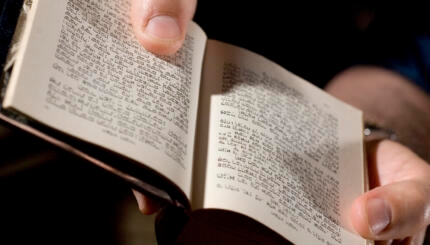Yishtabach is the concluding prayer of Pesukei d’Zimrah, the first section of the morning prayers that consists of various biblical verses of praise. In its theme and content it echos the opening prayer of this section, Baruch She’amar. The image of God as sovereign is central to both these prayers, occurring five times in Yishtabach and another four times in Baruch She’amar, orienting our perspective to the greatest, and most lofty sovereign, most deserving of praise.
In Yishtabach, the string of synonyms for “praise” and “song” extend and overlap, creating new words with new meanings. The couplets, shir u’shvacha/ hallel v’zimrah, both of which translate to “song and praise,” are neoplasms, two words that when read together create a novel idea. In this case, they point to a symphony of joyous harmony. Similarly, oz umemshalah, netzach gedulah ugevurah are all synonyms for God’s strength and power. Strung together, they evoke a sovereign that is untouchable, expansive and glorious beyond measure. The combination of words, and the robust new meanings they create, reinforce the idea that the human lexicon alone could never accurately describe God’s great majesty.
The author of Yishtabach signals this inadequacy in another way. The opening word, yishtabach, is in the reflexive form, meaning something akin to “will praise one’s self.” This suggests that we could praise God day and night and never touch the surface. Only God knows the extent of God’s own greatness and can offer the fullest expression of praise.
So if our words don’t suffice, why even try? What is the purpose of our verbosity?
With your help, My Jewish Learning can provide endless opportunities for learning, connection and discovery.
A Hasidic teaching from Rabbi Zev Wolf of Zhitomer offers a clue. The closing words of Yishtabach read as follows:
בָּרוּךְ אַתָּה ה’, אֵל מֶלֶךְ גָּדול בַּתִּשְׁבָּחות. אֵל הַהודָאות אֲדון הַנִּפְלָאות. הַבּוחֵר בְּשִׁירֵי זִמְרָה מֶלֶךְ אֵל חֵי הָעולָמִים
Blessed are You, Lord, most exalted God and King, Lord of wonders, who chooses melodious songs, God and King, life of the universe.
Struck by the redundancy of “melodious” and “song,” Rabbi Wolff suggests that the word for song — shir, spelled by the Hebrew letters shin, yud, resh — might actually be read shayar, meaning leftovers. In Hasidic thought, leftovers, or shirayim, were considered holy. The crumbs left by beloved teachers at a Sabbath meal were fought over and cherished by their followers.
And it’s not only in Hasidic thought. In music, the “leftover” is the infused silence that fills the symphony hall after the music has ended. The altered state of the air lingers for a while after having been engulfed by the music. Or consider the experience of burning incense. It isn’t the fire that is desirable, but the smoke, the afterward, the lingering aroma, that stirs us and awakens the spirit.
So it is with the lengthy verses of praise with which we open our morning prayer service. By the time we arrive at Yishtabach, we have sung our hearts out and opened our souls. This experience of chanting sacred words charts a course through us, leaving a sacred wake behind. Only then are we truly ready to carry on toward those core prayers, the Shema and the Amidah, that still lie ahead.
Yishtabach reminds us that our prayers are palpable, able to reach the unreachable God who is praised with or without us. But perhaps more critical, it nods to the sensation that is left over after a powerful and joyful prayer. It is the after-effect, more than the words themselves, that fuel our thoughts and our intentions in the day ahead and which is integral to an authentic prayer life.



